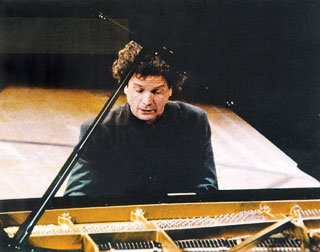International piano series with today's greats at keyboard
by Gwen Herat at the Royal Festival Hall, London
The International piano season this summer offers audiences an
enormous breadth of scores encompassing warmth and intimacy that
delights every heart, young and old. Many demonstrate poetic sensibility
that culminates with each pianist. The RFH reveals the repertoire that
many have become celebrated and identified.
 |
|
The prestigious pianist from
Switzerland, Andreas Haefliger in the International Piano
series
at the Royal Festival Hall, London. |
The international piano series is renowned for inviting the finest
talent from around the world. This season they have arrived as far as
from China, Brazil, Turkey, Macedonia and Switzerland to join the
British icons in a fiesta of classical piano music and are unaccompanied
by any other musical instrument. All these performers enjoy a
world-class reputation. They all play with unaffected gusto and powerful
lyrical impulse. The clarity of texture and the sense of momentum grip
each and every pianist, each evening as they perform one by one.
The RFH has always been on my agenda each time I visit the UK and
every visit to this citadel of classical music excites me.
Tonight, I am watching and listening to the distinguished pianist,
Andreas Haefliger who has come all the way from Switzerland to join in
the series. His is a welcome return and the auditorium is packed with no
seat left. His program contrasts with the heady Wagner with the
classical ethos of Mozart's beautiful sonatas. They are balanced against
the transcendent music of Schubert's Piano Sonata in B flat major. It is
described as beautiful, fluent music-making unimpeded by the physical.'
I find Haefliger to be one of music's great communicators because of
his richly coloured interpretations of the Romantic repertoire from the
19th century. Gentle on the keyboard as Mozart was, the great Master's
work flows in languid liquidity through his fingers on to the keyboard.
He provides a fresh insight into Mozart's creative genius as well as a
romantic air to Schubert's sublime piano music.
Tonight, he is playing Mozart's piano sonates, Schubert's sonata, and
Wagner's sonata. I am wondering why Haefliger opted for Wagner's
Isolde's Liebestod when the composer had a tremendous amount of
spectacular scores to select from.
Richard Wagner
No composer has had so much written about him, no one man has had an
influence on the course of his art before or since. He was a genius,
philosopher, a man of letters and a first class conductor apart from
being a key composer in history. But Wagner was arrogant and treated his
contemporaries with utter contempt. They included great Masters like
Verdi and Bach. Wagner's 'Tristan Und Isolde' (1856-1859) is played
tonight. This is a psychological music drama of great importance.
Isolde's Liebestod from Tristan means 'love-death' and is the final name
given to Isolda's last and ecstatic declaration of love. On piano,
S.447.
Franz Schubert
Gentle and mild just like his composing, this great composer also had
a niche for ballet music. He composed a great deal of orchestral,
chamber and piano music and wrote about 20 sonatas. His symphonies were
well received on strings as well and popular in all concert halls.
With a multitude of sonatas and piano works, Haefliger settled for
Piano Sonata in B flat, D 960 (1825). This sonata and few other were
written in quick succession in the last weeks of Schuber's life.
Composed in less than four weeks, they are among the greatest of his
works and today, the Royal Festival Hall is paying tribute to this
wondrous Master.
Wolfgang Amadeus Mozart
There has never been a child prodigy to match Mozart who died very
young at 35 years of age. Had he lived more, one will not be able to
count his music or pack them into a single book or for that matter, a
multitude of CDs. A prolific writer of Romantic music, he became the
greatest composer of his day, the finest conductor, pianist, organist,
and violinist in Europe. A walking encyclopedia of musicology, no one
can match his genius. Everyone adores his music and he is priority on
their lists. I need an ocean full of ink and a crate of pens to write
about his works and no wonder I waited patiently for Haefliger to take
on Mazart's Piano Sonata in C.K. 330 and in A.K. 331/00. They are
precious jewels, sparkling and radiantly played. There is hush, I can
feel the breathing of those around me. Such is the silence and when it
was over, there was a thunderous applause, calling Haefliger to play
more Mozart and he did. I think the audience is still not satisfied. As
I rose from my seat to mingle with the crowd streaming out, I was
thinking of having Mozart for dinner. He was so full in my mind.
|

